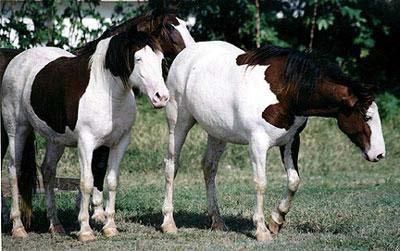From:TheBahamasWeekly.com
Salmon youth help save endangered Abaco Barb Horses
By AGweekly.com
Dec 10, 2009 - 2:07:04 PM

Once a mighty herd of 200, only six Abaco Barb horses remain today, including the stallion, Capella on the right. The horses are in grave danger of extinction. Photo by Susan Dudasik.
|
SALMON, Idaho - Though separated by thousands
of miles, youth from Salmon recently spent the day learning about the
six remaining critically endangered Abaco Barb Horses on Abaco Island
in the Bahamas.
The youngsters, ages six to 12, participated in
the Abaco Barb Day hosted by the Fabulous 4-H Fridays program, held in
conjunction with the Lemhi Afterschool Promise program. The day began
with the youth watching videos about the horses' history.
According to Milanne Rehor, head of Arkwild,
Inc. and the project director for WHOA, Wild Horses of Abaco
Preservation Society, "The herd once numbered about 200 but has
dwindled down to just six - three stallions and three mares."
"The
horses were brought to the island by the conquistadors during Columbus'
time and may have been survivors of various shipwrecks," Rehor said.
Several
DNA tests had confirmed a similar match to other breeds, but not an
exact match. It has been established that the horses descended from
those of Africa's Barbary Coast and were designated by the Horse of the
America's Registry as the Abaco Barb.
The horses were a newly
discovered strain of the endangered Spanish Barb and, according to
Rehor, "may well be the purest strain in existence." During the video
the youth learned about the horses' habitat, which was in the pine
forests and sandy beaches, and how they ate various vines, grasses and
leaves as well as sugar cane.
From a power point presentation created by
Katie Hoffman, Lemhi County's Family Consumer Science Extension
educator, they learned about the wild horse herds in Idaho.
They
also learned about Velma B. Johnson, best known as Wild Horse Annie,
who, in 1950, with the aid of thousands of schoolchildren and others,
started a campaign to save the wild horse herds from slaughter.
In
1959, Nevada Congressman Walter Baring introduced a bill prohibiting
the use of motorized vehicles to hunt wild horses and burros on all
public lands. The House of Representatives unanimously passed the bill,
which became known as the "Wild Horse Annie Act." It became Public Law
86-234 on Sept. 8, 1959.
Sadly that bill did not include Annie's
recommendation that Congress initiate a program to protect, manage and
control wild horses and burros.
Again public concern mounted.
Along with it came the realization that federal management, protection,
and control of wild horses and burros was essential and in 1971 the
Wild Free-Roaming Horse and Burro Act was enacted.
In a way, the
Afterschool Promise youth are following in the footsteps of those who
helped "Wild Horse Annie" over half a decade ago. The only difference
is that the horses they are helping are located on a tropical island in
the Bahamas. The youth also had a geography lesson as they used maps to
locate first the Bahamas, then Abaco Island where the horses live.
Following
the video presentation, the youth used horse magazines and other craft
supplies to decorate jars, which they plan to use for their service
project of raising funds to send for the horses. The decorated jars
will be distributed to various businesses throughout Salmon.
They
also personalized letters to Hubert A. Ingraham, the Prime Minister of
the Bahamas, and Earl Deveaux, the Minister of the Environment.
Then
the youth took turns taking photos of the Capella Abaco Barb model
horse created by Breyer Model Horse Company. Incidentally, the Capella
model was created because, several years ago, four members of the
Salmon Model Horse 4-H Club petitioned Breyer about the plight of the
Abaco Barb Horses.
Breyer responded with the creation of Capella, the first model in a series of benefit models.
For
several years the Salmon Model Horse 4-H Club's international service
projects had focused on the Abaco Barb Horses. Now, the Afterschool
Promise youth are following in their footsteps by helping to save the
small band of horses from extinction, and they encourage other youth
groups to join them and other youths internationally in find ways to
help the horses.
For more information on the Abaco Barb Horses, check out their website at www.arkwild.org.
R (Susan Dudasik is an equine journalist, mule enthusiast and the Idaho
representative for the American Trail Horse Association. She's competed
in numerous trail class events, holds clinics and teaches groundwork
and trail classes at Misfit Farm in Salmon, Idaho.)
Article SOURCE
© Copyright 2009 by thebahamasweekly.com -